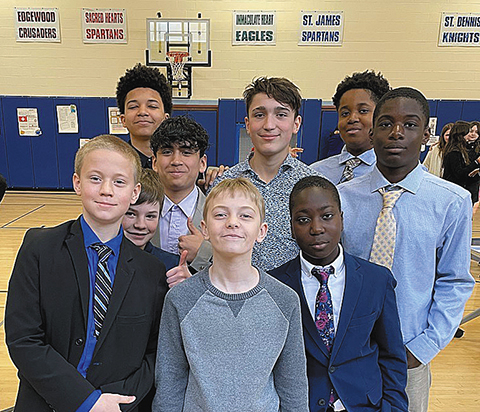
MADISON — “It was magical to see the students interact and respond among themselves to issues as they came up in class prior to the main assembly,” said St. James School in Madison science teacher Annya Fahey in describing her students’ participation in a modified model UN conference held in March at the school.
The program engaged students in a several-month process in which they learned more about the United Nations and climate change as well as enhanced their skills in public speaking, collaboration, researching and writing, and diplomacy.
Mary Anderson, middle school social studies teacher, led the effort after a parent suggested the program.
Anderson, who grew up in the parish and graduated from St. Norbert College in De Pere, Wis., was enthusiastic about the idea and wanted to make sure to involve the rest of the staff, especially her middle school colleagues: Lauren McCall, math/language arts teacher; and Fahey.
Anderson learned that Jack Childers, a 2010 St. James graduate and the son of school librarian Luellen Childers, had participated in a model UN at Verona Area High School.
Childers was eager to help modify the high school program for St. James School.
Learning across curriculum
After the teachers met with Childers in the fall, they were ready by January to get the students involved.
Students explored the chosen topic of climate change across all subject areas.
During social studies class, students learned more about the UN and researched their assigned countries individually.
Each student wrote a position paper in language arts to propose solutions.
While the middle school students were the focus, the whole school was involved in learning more about the climate crisis and the role of the UN in addressing peace and security, human rights, development, and the rule of law.
Students in Kindergarten to grade two made flags and name plates which were displayed for each country on the day of the assembly.
Third graders created posters on environmental issues. Fourth and fifth graders conducted research on various countries and their family histories and created display boards with their results.
Student ownership of learning
“As a teacher, I am so proud of their work. Some of the students did not even know where their assigned countries were, but in the end, each student really took ownership of their research,” said Anderson.
She was especially pleased with the students’ understanding of the impact that countries have on each other.
Fahey was pleased that “outside of class, students naturally discussed alliances among countries and helped one another appreciate their country’s potential. Students voluntarily shared their findings and learned about their peers’ countries, as well.”
Childers served as “esteemed political officer” and fact checker while Subbu Ravi, father of Maya Mahal-Ravi, acted as the Chair of the General Assembly.
Maya’s mother, Rama Mahal, chaired the committee on reducing fossil fuel emissions.
Notesong Srisopark Thompson, mother of Beannie and JuJu, led the renewable energy committee. Ericka Wills and Josh Young, parents of Willow Ummel, led the composting to reduce food waste committee.
Language arts/math teacher McCall shared some of the comments of her students.
- Seventh grader Anissa Attidekou: “Climate change is being addressed by many countries, but not enough are taking action. Even though countries with the most economic power release the most greenhouse gasses into the atmosphere, they do not bear the resulting consequences.”
- Seventh grader Maya Mahal-Ravi: “Fossil fuel burning started in the 1800s. Many islands like the Maldives, Solomon Islands, and Tuvalu are in the process of getting swallowed by rising sea levels. With recent rates being unprecedented over the past 2,500-plus years, sea levels are rising more than ever.”
- Sixth grader Blaise Maurice: “Experts have predicted that Greenland could totally disappear by 2150. China, the United States, and India: We need you and countries like you to stop producing so much CO2!”
- Sixth grader Phanuel Hammond: “According to the Harvard T.H. Chan School of Public Health, by the end of this century, climate change could increase the number of heat-related deaths in Kuwait by 5.1 percent to 11.7 percent.”
“Students reflected on deep learning about various governments and the climate crisis,” said Fahey as she shared the comments of one seventh grader, “Our committee worked well together. We used our time efficiently and almost everyone gave input.”
A sixth grader commented on the opening ceremony, “It felt like we were the actual United Nations.”
Parent and committee leader Thompson stated, “I was so impressed with every aspect of the event. It was my honor to be part of this milestone achievement for St. James School.”
Everyone enjoyed a multinational food luncheon provided by volunteers from the school and parish and coordinated by Chris Eshun, fourth grade teacher.
- Ghana — Jollof (Evelyn Hammond)
- Nigeria — fufu, egusi, soup, stew, puff puff, fried plantains (Angie Nwani)
- Zambia — beans and rice, greens, cornbread, stew (Joyce Gnewuch)
- Philippines — pancit (Gie Best)
- Italy — lasagna, spaghetti and meatballs (Eshun)
- Germany — German potato salad (MaryAnn Haack), brats (Eshun), sauerkraut (John Haas)
- India — chicken (Mrs. Johnson) and samosa (Rama Mahal)
- Mexico — cheese burritos (Marie Lagunas)
- U.S. — hot dogs
Students will continue learning about environmental issues as well as taking action.
The school started composting food waste from lunchtime last year and received a grant of $1,100 from groups within the Dane County Environmental Council for an ongoing study of composting, reducing food waste, and using the soil that is created.
The middle school teachers will continue to work together to offer opportunities for the students and have invited parents and parish members to add their interest and expertise.

